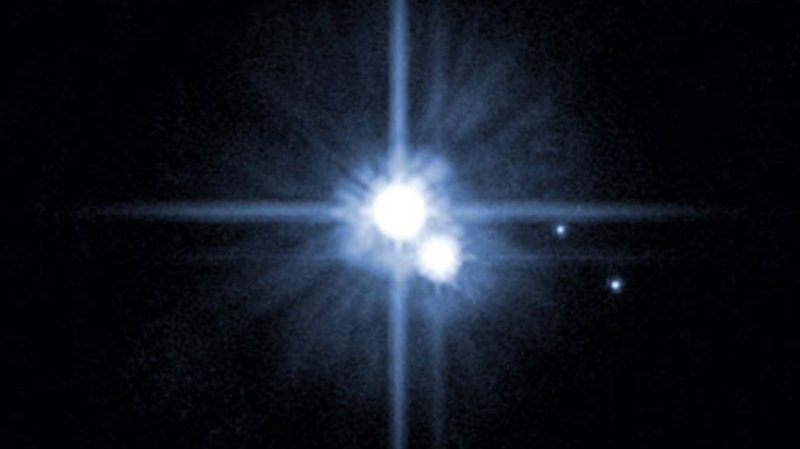1 of 3 | Astronomers declared that Pluto is no longer a planet at an International Astronomical Union meeting in Prague, Czech Republic on Aug. 24, 2006. This image from the Hubble Space Telescope in 2005 shows Pluto, its moon Charon (below and right of center) and two newly discovered moons to the right. (UPI Photo/NASA) |
License Photo
When the prestigious Kavli Prize for Astrophysics was announced for 2012, one of the winners was Mike Brown, an astronomer working at the California Institute of Technology in California.
Possibly not a household name, but Brown is the reason schoolchildren today are being taught our solar system is comprised of eight planets, not the nine we've been told of for more than seven decades.
Children no longer learn the mnemonic device to name the planets, in order, from the sun outward: Mother Very Thoughtfully Made A Jelly Sandwich Under No Protest. (Mercury, Venus, Terra [Earth], Mars, Jupiter, Saturn, Uranus, Neptune and Pluto. It even correctly identified the asteroid belt as the "A" between Made and Jelly, Mars and Jupiter.)
Not that the number of planets hasn't changed as human knowledge of the heavens has grown.
For much of human history, the number of known planets was limited to five, the ones visible to the human eye: Mercury, Venus, Mars, Jupiter and Saturn. (Earth was considered the center of the universe, thus not a planet, until Copernicus put the sun at the center and the Earth joined its planetary siblings.)
The invention of the telescope, which became ever stronger and could see farther, upped the planetary census: Uranus in 1781, Neptune in 1846 and finally distant and tiny Pluto, named for the god of the underworld (not for the Disney dog) in 1930.
So the total planetary menagerie stood at nine for 75 years, until 2005.
Enter Mike Brown.
In 2005 Brown was leading at team at California's Palomar Observatory searching for so-called trans-Neptunian objects, solar system inhabitants of what has been dubbed the "scattered" disc, with highly eccentric orbits extending to the most distant reaches of our system.
In January of that year Brown and his team discovered Eris, the most distant known natural object in the Solar System other than comets.
More massive and possibly larger than Pluto, it was first put forward as the Solar System's 10th planet.
But it posed a conundrum that was immediately apparent.
Astronomers were confident that with improved telescopes and observation techniques the chances of finding similar-sized object to Eris in the scattered disc -- perhaps scores of them -- was high.
So if Eris was a 10th planet, then the solar system might soon include an 11th, then a 12th, and so on for who knew how many?
That possibility led the International Astronomical Union to consider the absolute definition of the term planet for the first time.
In 2006, under a new IAU definition of planets, Eris was deemed a "dwarf" planet, consigned to a new Minor Planet Catalog.
But where, then, did that leave Pluto, less massive than Eris, and possibly even smaller?
It left it outside the planetary club, looking in, now officially branded by the IAU a "dwarf planet" like its cousin Eris and all other scattered disc objects of similar size to come.
So goodbye, nine-planet solar system, hello to a slightly abridged version.
Is Mike Brown sorry for being personally responsible for the "demotion" of Pluto?
Apparently not, since he wrote a book about his discovery of Eris titled "How I Killed Pluto and Why It Had It Coming."
And mom's jelly sandwich is now relegated to the ever-growing catalog of historical anachronisms, interesting but obsolete.
At least we still have Disney's dog.















